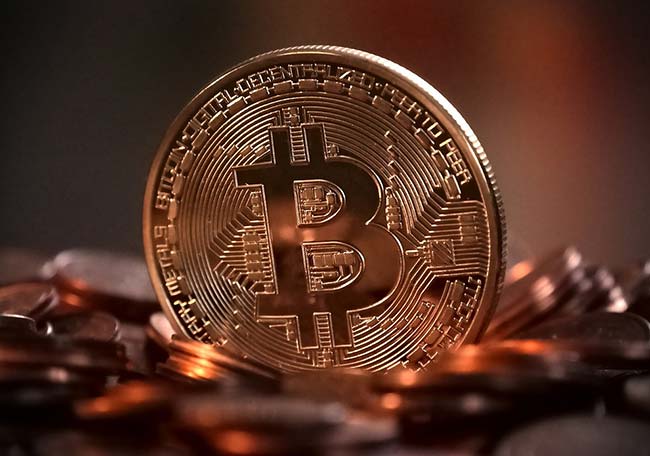You might remember your grandpa’s old typewriter.
A clunky old thing that was unusually loud, uncomfortably heavy, and frustratingly impractical.
A black chunk of blocky metal.
It kept jamming every few minutes if you didn’t know how to press the keys just right, and it left your fingers stained blue whenever you had to change the ink ribbons.
While your grandpa loved it, you were a little less convinced – why bother with something that obsolete when you can have a sleek, shiny new laptop that’s as light as a feather, barely makes a sound when you type, and can store all your documents on a hard drive that takes up no space at all.
Personal computers over typewriters, emails over letters, cell phones over landlines, Netflix over cable, Uber over taxis.
And what’s next, cryptocurrencies disrupting traditional banking and payment services?
We’ve yet to find out.
Even though it’s been around since 2009, blockchain is still a buzzword on everyone’s lips.
While no one can truly predict the extent of its impact in the future, we do know that change is coming.
As with any innovative form of technology, disruptions can be expected.
Here’s which industries need to be on the lookout for potential problems and opportunities.

Article Chapters
Banking
The bank always takes a fee.
You want to wire some cash to your mom to help her pay the bills?
The bank will take a small percentage or a set fee, and if she’s overseas, the rates will be even higher.
While banks usually don’t charge too much for these kinds of services, one portion of your money will still go to the bank instead of your mom.
Blockchain, on the other hand, enables you to wire money for much smaller fees and through channels that are inherently even more secure than what banks offer.
There’s almost no risk of a system collapse, and it’s nearly impossible to steal from it because there’s no central “vault.”
The decentralised way blockchain works enables everyone to have their own private safe space to store money, bank records, and other documents.
Blockchain is based on public ledgers that anyone can access, and this eliminates the need for a trusted third party source to handle transactions.
Your transactions are 100% your own, you have all of the autonomy.
However, banks are now developing their own cryptocurrencies and adopting blockchain solutions.
This will improve their services, and reduce operational costs.
And it’s unlikely the government would ever allow banks to fall apart.
The blockchain is disruptive, but it won’t break the banks – they will merely have to adjust.
Healthcare
Healthcare is about to change drastically.
The way things are now, the medical industry spends a huge chunk of its funding on operational costs like filing, record keeping, and accounting.
Your medical records are kept in centrally located files, which are subject to data breaches, theft, and loss.
Blockchain can solve this.
Currently, patient records are spread across multiple providers and organizations, but blockchain could help medical professionals put together all of these pieces of data in real-time and ensure that everything is comprehensive and up-to-date.
Patients will be able to access their medical information regardless of where they are in the world, and they will still be highly-secure.
This is one of the most practical ways to manage massive amounts of data and make it easier for doctors to give diagnoses.

Government
Say goodbye to voter fraud.
Traditional voting relies on mail votes or standing in line to vote in a booth.
And these votes have to be counted.
This makes fraud relatively easy, and regular online voting isn’t much better either.
Because a central authority is used, problems appear.
Blockchain can help here too.
People can vote online without revealing their identity, and the system can count the votes with 100% accuracy because it knows that one vote is always attributed to one specific ID.
One such platform already exists – MiVote.
This program works like a digital ballot box, and it’s token-based.
Once you make a registration in the official ledger you can vote through your smartphone and the whole process is smooth, reliable, and secure.
Implementing blockchain in government systems has other benefits, too.
It makes it very difficult to skew data, so government records will become even more difficult to tamper with.
It discourages corruption and opacity, which means politicians will have to be a lot more open about what they’re doing.
This transparency is there for us regular folks as well – digital asset registries will become available and blockchain will make it much more difficult to do things like commit tax fraud.
Retail
Blockchain will directly affect supply chain management and retailers.
Why do we even go to stores?
Because that’s the middleman we need when we want to get a pack of gum, a shiny new gadget, or a washing machine.
With blockchain, buyers and sellers can be directly connected, without any need for additional fees for the middleman.
Blockchain also tracks everything.
Let’s say, for example, you decide to buy some apples and have them delivered.
When you get them and bite into one, you realise it’s all bruised and as sour as a lemon.
Who do you blame for this?
Blockchain transparency allows you to retrace all the steps, from the delivery company, to the store, to the supplier, to the producer, even to the farmer who grew them.
We’ll be able to find the weak links and companies will be able to build their reputation through validated transactions shared by multiple supply chain partners.
Intellectual Rights
There are already startups that are giving musicians the option to get paid directly from fans instead of giving away a percentage of their earnings to record companies or platforms.
Blockchain makes it possible to better catalog songs with their respective creators, and it solves the issue of licensing because it offers hashing and proof of existence.
Hashing is like your digital fingerprint because it allows a document to be processed into a fix code that’s yours alone, and it can’t be copied or repeated.
Proof of existence is the recording of these hashes on the blockchain.
This makes it easy to trademark or patent something, and prove authorship.
Companies such as Binded allow artists to protect original images that they have created, and companies such as Ujo Music allow them to protect their music.
Our future is in blockchain.
Whether it turns our world upside down all at once or allows us to embrace it step by careful step, there’s no running from it.
The world is posed to implement new blockchain solutions into everything, and now it’s up to us to learn more about them and use them to their full advantage.

